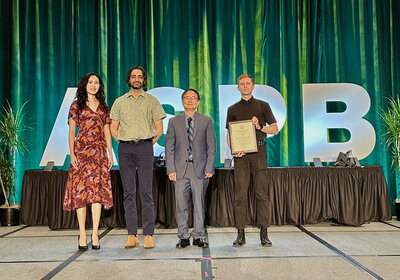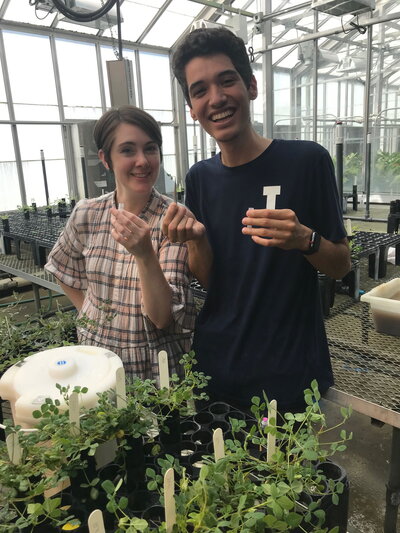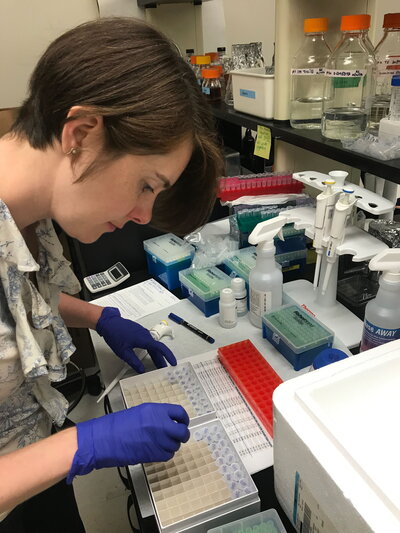

The Department of Plant Biology and the School of Integrative Biology mourns the loss of Dr. Amy Marshall-Colón, an Associate Professor of Plant Biology, who passed away on July 26, 2025. A researcher in systems biology and a devoted educator and mentor, Amy’s passing marks the loss of a scientist whose work bridged scientific fields and fostered meaningful international partnerships, leaving behind a legacy of innovation, mentorship, and collaboration.
Amy joined the Department of Plant Biology at Illinois in 2014, where she quickly gained recognition for her work in multi-scale computational modeling of plant systems. Her research centered on understanding how plants respond to environmental stress, combining genomic and molecular data with advanced modeling techniques to make predictions about whole-plant behavior. She was a central figure in the “Crops in Silico” initiative, a collaborative effort that aimed to create virtual plants by integrating models from molecular biology to ecosystem dynamics. Through this work, she helped pave the way toward more resilient crops in the face of global change and food insecurity.
Amy was a vital contributor to both the RIPE and CABBI research teams, where her scientific leadership and collaborative spirit left an enduring impact. As a key member of RIPE, she led the modeling efforts, integrating data across the project to support advances in photosynthetic modeling. “She will be sorely missed,” noted Lisa Ainsworth, Professor of Plant Biology and RIPE Director, “Her vision and leadership left a lasting legacy not only within RIPE, but across the broader plant science community.”
In her role with CABBI, Amy led studies on gene networks regulating the development and metabolism of grass crop stems, a crucial step toward engineering crops to produce high-value bioproducts. “Amy was notable for her ability to build collaborative teams to address challenging problems with cutting-edge methods for collecting and analyzing data,” said Andrew Leakey, Professor of Plant Biology and CABBI Director. “It is a huge personal and professional loss to no longer have her on the project, but she has left a legacy of trainees and a mindset that will continue to be impactful.”
Her scientific accomplishments were recognized internationally in 2021, when she was awarded the prestigious Friedrich Wilhelm Bessel Research Award by the Alexander von Humboldt Foundation. The award, granted to internationally renowned scholars, supported her collaborative sabbatical work at the University of Bonn. There, Marshall-Colón became involved with the PhenoRob Cluster of Excellence—an interdisciplinary group focused on the future of crop production through robotics, AI, and plant phenotyping. As part of the Faces of PhenoRob series, she was featured in a video interview where she described her passion for integrating modeling with on-the-ground agricultural challenges and her belief in the power of international collaboration to advance sustainable agriculture.

Her impact was not only confined to the lab. Amy was a passionate educator whose classroom innovations earned her the 2025 Excellence in Education Award from the American Society of Plant Biologists. That honor, announced earlier in April and awarded to Amy’s lab members on July 26 on her behalf, reflected her commitment to developing bioinformatics tools for students and her dedication to mentoring young scientists. She was known not only for her scientific rigor but also for her compassion, energy, and the remarkable clarity with which she could explain complex biological systems.
Amy’s influence as a mentor extended far beyond her immediate lab group. Megan Matthews, now an Assistant Professor in the Department of Civil and Environmental Engineering, described Amy as “an amazing mentor and advocate” who continued to support her even after she left the lab. From inviting her into the Crops in Silico project as a postdoc to introducing her to the broader research community, Amy consistently created opportunities for others to grow. “She was always looking out for and sharing opportunities that would help me advance in my research and career,” Matthews said. “Amy has always worked to lift up her students, postdocs, and other mentees and showcase their skills and work in the research community.” Whether through one-on-one guidance or broader structural efforts in education and mentorship, Amy’s legacy lives on in the many young scientists she empowered.

Within SIB, Amy worked together with Plant Biology Department Head and close colleague Katy Heath to lead a transformative redesign of IB 204 Genetics, a foundational course taken by all Integrative Biology majors. From 2015 to 2021, their collaboration shaped the course into a more skills-based, problem-solving experience, emphasizing real-world applications of genetic knowledge. Amy brought not only deep scientific expertise but also a remarkable attentiveness to the well-being and development of both undergraduates and graduate teaching assistants.
As Senior Lab Coordinator Nick Morphew recalled, working with Amy during the course and lab restructuring was one of the highlights of his time in SIB. He praised her leadership model in IB 204 Genetics: “She was not afraid to tackle difficult situations and display great leadership by finding the right tact for a situation. Whether it was a student or teaching assistant, she could be appropriately tough but fair, empathetic and forgiving, or humorous and light-hearted.” Amy’s efforts, he noted, made IB 204 Genetics “a well-run course with high standards” and a genuinely rewarding experience for everyone involved. As Professor Brian Allan put it, every Integrative Biology major who took the course during those years benefited from Amy’s “impressive expertise as a scientist and educator.”
As the Department of Plant Biology and the School of Integrative Biology grieve the heartbreaking loss of Amy at such a young age, when so much still lay ahead, her work continues to make a lasting impact. Recently, a new publication in the Proceedings of the National Academy of Science was led by Amy, Katy, former postdoc Rizwan Riaz, and other collaborators. Amy brought her expertise in gene expression and predictive modeling to the study of plant-microbe symbiosis – a major contribution to the growing field of systems genetics, which takes a broad view of genetics by integrating -omics data with important complex traits. The paper reflects her continued dedication to pushing boundaries in research, even in her final months.

Amy’s career was defined by her commitment to bridging scales and to the ideal that science must rise to meet the challenges of our changing world. She worked tirelessly to make plant biology more integrative, more data-driven, and more collaborative. In doing so, she helped shape the future of plant science and trained a generation of students to think across disciplines and borders.
Her colleagues at the University of Illinois and around the world will remember her not only as a gifted scientist but as a vibrant and generous member of the scientific community. She is survived by family, friends, students, and collaborators whose lives and careers were shaped by her brilliance and her warmth. Her legacy endures in the lives she touched, the questions she pursued, and the discoveries still to come from the seeds she planted.